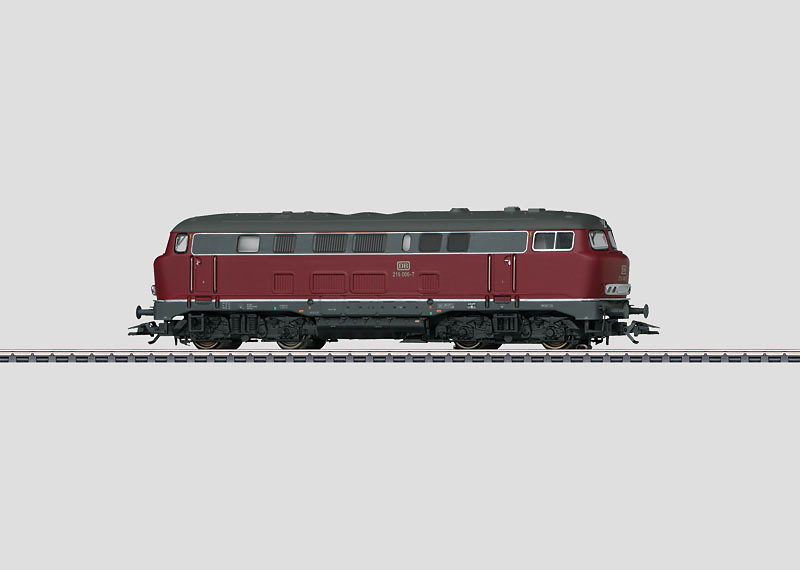Diesel Locomotive.

| Article No. | 37740 |
|---|---|
| Gauge | H0 |
| Design type | 1:87 |
| Era | IV |
| Kind | Diesel Locomotives |
Highlights
- New tooling for the pre-production series "Lollo" V 160 locomotive.
- Frame and body constructed of metal.
- mfx decoder with extensive light and sound functions.
Product description
Model: The locomotive has an mfx digital decoder and extensive sound functions. It also has controlled high efficiency propulsion with a flywheel, centrally mounted. All 4 axles powered through cardan shafts. Traction tires. The triple headlights and dual red marker lights change over with the direction of travel, will work in conventional operation, and can be controlled digitally. The headlights are maintenance-free, warm white LEDs and the marker lights are maintenance-free, red LEDs. The locomotive has separately applied metal grab irons on the sides and ends. It also has detailed buffer beams. Brake hoses are included that can be installed on the locomotive. Length over the buffers 18.4 cm / 7-1/4".
Publications
This model can be found in a DC version in the Trix H0 assortment under item no. 22174.
Publications
- New items brochure 2011 - Product programme 2011/2012 - Product programme 2012/2013 - Product programme 2013/2014Prototype information
V 160 Pre-Production Series In 1956 the German Federal Railroad‘s central office in Munich contracted with the locomotive builder Krupp in Essen to develop a single-motor, general-purpose diesel locomotive. Originally, the plan was for a unit with a nominal power output of 1,600 horsepower and a class designation of V 160 in keeping with the conventions of that time. The plan for the locomotive was for two engineer‘s cabs, two two-axle trucks, a maximum speed of 120 km/h / 75 mph, a maximum length over the buffers of around 16,000 mm / 52 feet 6 inches as well as sufficient train heating for an express train of ten cars. A maximum axle load of 18 metric tons was planned to enable operation on expanded branch lines. Hydraulic fluid transmissions were planned for transmitting power to the wheels. It was planned that the new V 160 would replace the provincial steam locomotives with the class numbers 38.10, 39, 55.25, 56.20, and 57.10 as well as the standard design locomotive with the class numbers 03 and 50. During the development phase of the V 160 it was possible to increase the motor performance to 1,900 horsepower with improved supercharging and forced air cooling. In 1960/61 the firm of Krupp delivered six prototypes as the road numbers V 160 001-006, which were equipped with different 1,900 horsepower motors and gear drives. In 1962/63 four additional units followed (V 160 007-010) from Henschel. The first nine locomotives had fully rounded ends beneath the windshields which quickly gave them the nickname „Lollo“ (after the Italian film star Gina Lollobrigida). The tenth locomotive by contrast had the angled look taken from the V 320 001, that was to become the typical characteristic of the entire V 160 family. The frame and the superstructure were of lightweight steel construction, completely welded. Between the two engineer‘s cabs insulated against sound was the engine room with its propulsion layout, cooling equipment, and oil-fired forced-flow boiler for train heating. It was accessible by a side corridor. The power transmission was done with a Voith fluid transmission that had to be developed from scratch for motors of the performance class. In addition, road numbers V 160 001-009 also had equipment for shuttle train operation and multiple unit lashups.
Features
Warning
| Control Unit | Mobile Station | Mobile Station 2 | Central Station 1/2 | Central Station 3/2 | |
|---|---|---|---|---|---|
| Headlight(s) | X | X | X | X | X |
| Diesel locomotive op. sounds | X | X | X | X | X |
| High Pitch Horn | X | X | X | X | X |
| Direct control | X | X | X | X | X |
| Sound of squealing brakes off | X | X | X | X | |
| Headlight(s): Cab2 End | X | X | X | X | |
| Low Pitch Horn | X | X | X | X | |
| Headlight(s): Cab1 End | X | X | X | X |